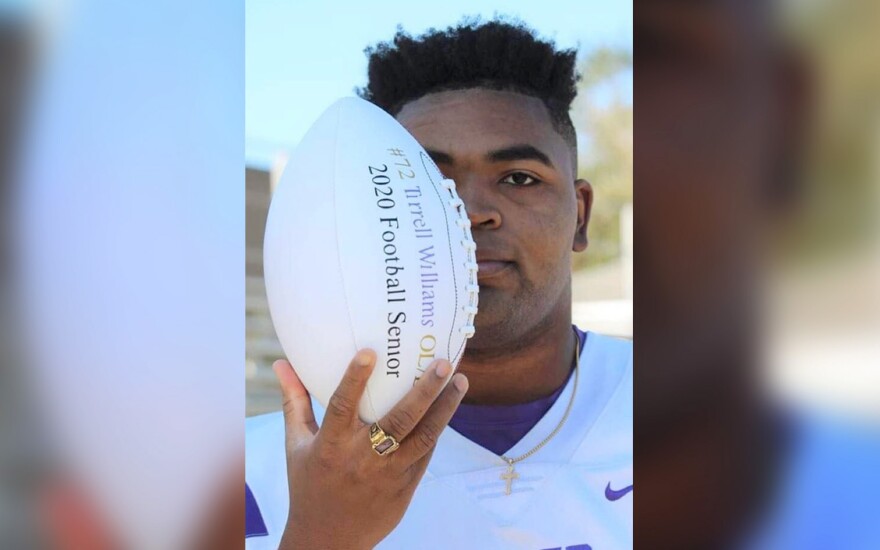Almost two years to the day that her son died after a grueling pre-season football workout at Fort Scott Community College, Natasha Washington made the trip from suburban New Orleans to a federal courtroom in Kansas City, Kansas, to settle her negligence and civil rights case against the school.
Tirrell Williams collapsed in August 2021 after the team was forced to run sprints and do hundreds of up-downs, where players drop to the ground and then pop back up. The exercises were not part of a planned workout — players say coach Carson Hunter was punishing the team after he found a piece of trash on the practice field. Players also alleged the team was denied water.
Williams dropped to the ground mid-workout and was unable to get back up. He died two weeks later at the University of Kansas Hospital. It was, his mother said during Tuesday’s settlement hearing, the first time her son ever left home.
“Carson Hunter refused to provide Tirrell Williams with proper care, hydration, or coverage despite forcing him to go through a reckless training regimen in unsuitable conditions,” the suit alleged.
The settlement between Washington, the Fort Scott Community College Board of Trustees and Hunter was approved Tuesday by Senior Judge Julie Robinson.
“I’m so sorry for the loss of your son,” Robinson told Tirrell’s mother.
Terms of the settlement were not disclosed but in Kansas, there is a $500,000 cap on damages for public institutions in most cases.
Williams was beloved by his FSCC teammates.
“This dude never stopped smiling. It could be raining, and he would be literal sunshine,” Donald Harper told KCUR last year. “There was no sadness in him. He was all joy.”
Fort Scott Community College discontinued its 93-year-old football program soon after Williams died but the school said it was a purely financial decision.
After leaving Fort Scott Community College, Hunter coached football part-time at the University of West Florida in Pensacola, but is now a history teacher at Daphne High School in suburban Mobile, Alabama, according to online records from the state department of education. The high school’s website does not list Hunter as a coach for any sport.
Williams is one of several high-profile heat-related deaths of football players in Kansas.
In 2018, 19-year-old Braeden Bradforth died under similar circumstances at Garden City Community College in southwest Kansas. And earlier this month, 19-year-old Myzelle Law died after a football practice at MidAmerica Nazarene University in Olathe.
After the hearing, Washington said she has been reading about Law’s death.
Hundreds showed up for Law’s celebration of life Saturday. So far, the school has said nothing about the teen’s death. The school won’t confirm if it is conducting an internal investigation.





